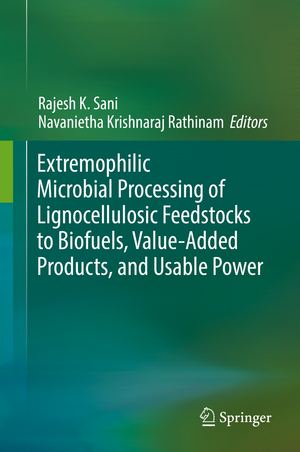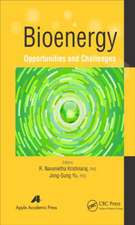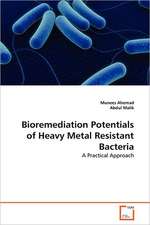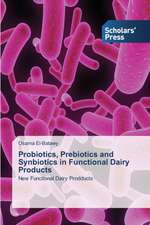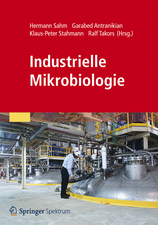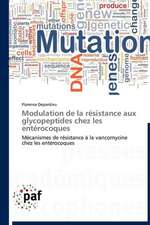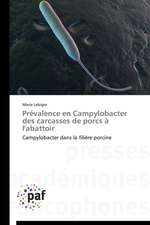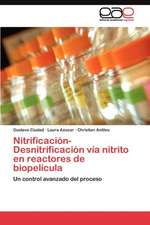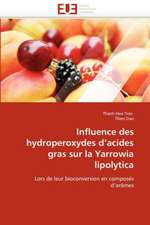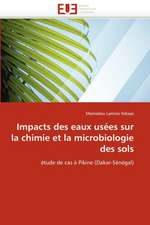Extremophilic Microbial Processing of Lignocellulosic Feedstocks to Biofuels, Value-Added Products, and Usable Power
Editat de Rajesh K. Sani, Navanietha Krishnaraj Rathinamen Limba Engleză Hardback – 12 iul 2018
This book presents a review and in-depth analyses of improved biotechnological processes emphasizing critical aspects and challenges of lignocellulosic biomass conversion into biofuels and value-added products especially using extremophiles and recombinant microorganisms. The book specifically comprises extremophilic production of liquid and gaseous biofuels (bioethanol, biobutanol, biodiesel, biohydrogen, and biogas) as well as value added products (e.g. single cell protein, hydrocarbons, lipids, exopolysaccharides, and polyhydroxyalkanoates). The book also provides the knowledge on how to develop safe, more efficient, sustainable, and economical integrated processes for enhanced conversion of lignocellulosic feedstocks to liquid and gaseous biofuels. Finally the book describes how to perform the techno-economical and life-cycle assessments of new integrated processes involving extremophiles. These modeling exercises are critical in addressing any deficiencies associated with the demonstration of an integrated biofuels and value-added products production process at pilot scale as well as demonstration on the commercialization scale.
| Toate formatele și edițiile | Preț | Express |
|---|---|---|
| Paperback (1) | 450.36 lei 38-44 zile | |
| Springer International Publishing – 4 feb 2019 | 450.36 lei 38-44 zile | |
| Hardback (1) | 653.33 lei 3-5 săpt. | |
| Springer International Publishing – 12 iul 2018 | 653.33 lei 3-5 săpt. |
Preț: 653.33 lei
Preț vechi: 768.62 lei
-15% Nou
Puncte Express: 980
Preț estimativ în valută:
125.01€ • 130.53$ • 103.23£
125.01€ • 130.53$ • 103.23£
Carte disponibilă
Livrare economică 25 martie-08 aprilie
Preluare comenzi: 021 569.72.76
Specificații
ISBN-13: 9783319744575
ISBN-10: 3319744577
Pagini: 310
Ilustrații: XII, 308 p. 46 illus., 32 illus. in color.
Dimensiuni: 155 x 235 x 21 mm
Greutate: 0.78 kg
Ediția:1st ed. 2018
Editura: Springer International Publishing
Colecția Springer
Locul publicării:Cham, Switzerland
ISBN-10: 3319744577
Pagini: 310
Ilustrații: XII, 308 p. 46 illus., 32 illus. in color.
Dimensiuni: 155 x 235 x 21 mm
Greutate: 0.78 kg
Ediția:1st ed. 2018
Editura: Springer International Publishing
Colecția Springer
Locul publicării:Cham, Switzerland
Cuprins
Preface.- Contributions.- Acknowledgements.- Bioprospecting of Extremophiles for Biotechnology Applications.- Conversion of Lignocellulosic Feedstocks into Bioethanol using Extremophiles.- Biobutanol production using Recombinant microorganisms/Extremophiles.- Biodiesel from Extremophilic Microalgae.- Hydrogen production from lignocellulosic feedstocks using extremophiles.- Biogas from Extremophiles.- Conversion of Lignocellulosic Feedstocks into Biogas:Upgrading and Utilization.- Bioconversion of Methane for Value Added Products.-Exopolysaccharides Production from Extremophiles:The Chemical Structure and Their Bioactivities.- Polyhydroxyalkanoates Production from Renewable and Waste Materials using Extremophiles/Recombinant Microbes.- Rewiring Extremophilic Electrocatalytic Processes for Production of Biofuels and Value-added Compounds from Lignocellulosic Biomass.- Integrated Consolidated Bioprocessing for Conversion of Lignocellulosic Feedstock to Biofuels and Value-added Bioproducts.- Value added products from wastes using extremophiles in biorefineries – Process modelling, simulation and optimization tools.- Index.
Notă biografică
Rajesh K. Sani is an Associate Professor in the Department of Chemical and Biological Engineering and Chemistry and Applied Biological Sciences at the South Dakota School of Mines and Technology, South Dakota. He joined the South Dakota School of Mines and Technology as an Assistant Professor in 2006. Prior to this, he worked as a Post-doctoral Researcher and Research Assistant Professor at the Washington State University, Pullman, WA, and focused his research on Waste Bioprocessing. He also served as an Associate Director of NSF Center for Multiphase Environmental Research at the Washington State University. He received his BS in Mathematics from the Meerut University in India, his MS in Enzyme Biotechnology from Devi Ahilya University in India, and his PhD in Environmental Biotechnology from the Institute of Microbial Technology in India.
Due to his interdisciplinary background, Sani has been integrating engineering with biologicalsciences in his teaching as well research endeavors. For over thirteen years, Sani has engaged in a constant endeavor to improve his teaching skills to become an effective instructor and communicator. In Washington State University’s School of Chemical and Bioengineering and Center for Multiphase Environmental Research, he taught a variety of engineering courses including Integrated Environmental Engineering for Chemical Engineers, Bioprocess Engineering, and Current Topics in Multiphase Environmental Research - a team taught interdisciplinary course to undergraduate and graduate students. Over the last eleven years at the South Dakota School of Mines and Technology, he has been teaching various science and engineering curses including Microbiology for Engineers, Biochemistry Laboratories, Bioinformatics, Molecular Biology for Engineers, Microbial Genetics, and Microbial and Enzymatic Processing to students of various disciplines of Chemical Engineering, Environmental Engineering, Applied Biological Sciences, Chemistry, Interdisciplinary Studies, Biology, Medical, and Paleontology. Sani has received several awards including the outstanding student research (India), Department of Biotechnology Scholarship (India), the Council of Scientific and Industrial Research (India), and Science and Technology Agency (Japan).
Sani group’s research includes Extremophilic Bioprocessing, Biocatalysis, Biomaterials, Gas to Liquid Fuels, Genome Editing of Extremophiles, Homo/Heterologous Expression of Genes, and Metabolic Engineering. Over the past 11 years, he has been the PI or co-PI on over $17.95 million in funded research. Several of his accomplishments in research and advising include: i) Postdocs supervised (8); ii) Graduate students supervised (MS students, 10 and PhD, 11), and iii) Undergraduate students and K12 teachers supervised (over 60). He has one patent, five invention disclosures, and published over 60 peer-reviewed articles in high impact factor journals, and have contributed in several book chapters. He has edited four text books and one proceedings for Springer International Publishing AG. In addition, I have been in proposal panel for the Federal Agencies i) National Science Foundation, ii) U.S. Army Research Office, iii) Department of Energy, and iv) U.S. Geological Survey. He also serves the Industrial Microbiology profession as “Biocatalysis Program Committee Member” of the Society for Industrial Microbiology and Biotechnology (SIMB), technical session chair at the Annual American Institute of Chemical Engineers (AIChE) and SIMB, and an associate editor.
Prof. R. Navanietha Krishnaraj – R. Navanietha Krishnaraj is a Research Professor in the Department of Chemical and Biological Engineering, South Dakota School of Mines and Technology, USA. His research interests include bioelectrocatalysis, single cell electrochemistry, and space biology. His has rich experience in developing different configurations of bioelectrochemical systems for bioenergy and environmental biotechnology applications. Currently he has three ongoing research projects in microbial electrolysis, and microbial electrosynthesis of biopolymers and value-added products. He also serves as a PI for an outreach activity project on training the farmers in organic agricultural practices. He recently received the prestigious Bioenergy Award for Cutting Edge Research from Indo-U.S. Science and Technology Forum. He is a recipient of several awards including Australian Overseas Research Award, and Young Faculty Award in Engineering in 2017. He received his PhD in Chemical Engineering in the field of Bioelectrochemical Systems. He has published over 25 research articles, 10 book chapters, 4 books, and 1 patent to his credit. He is a member of several renowned professional societies including Society for Industrial Microbiology and Biotechnology (SIMB), and American Society for Gravitational and Space Research (ASGSR).
Due to his interdisciplinary background, Sani has been integrating engineering with biologicalsciences in his teaching as well research endeavors. For over thirteen years, Sani has engaged in a constant endeavor to improve his teaching skills to become an effective instructor and communicator. In Washington State University’s School of Chemical and Bioengineering and Center for Multiphase Environmental Research, he taught a variety of engineering courses including Integrated Environmental Engineering for Chemical Engineers, Bioprocess Engineering, and Current Topics in Multiphase Environmental Research - a team taught interdisciplinary course to undergraduate and graduate students. Over the last eleven years at the South Dakota School of Mines and Technology, he has been teaching various science and engineering curses including Microbiology for Engineers, Biochemistry Laboratories, Bioinformatics, Molecular Biology for Engineers, Microbial Genetics, and Microbial and Enzymatic Processing to students of various disciplines of Chemical Engineering, Environmental Engineering, Applied Biological Sciences, Chemistry, Interdisciplinary Studies, Biology, Medical, and Paleontology. Sani has received several awards including the outstanding student research (India), Department of Biotechnology Scholarship (India), the Council of Scientific and Industrial Research (India), and Science and Technology Agency (Japan).
Sani group’s research includes Extremophilic Bioprocessing, Biocatalysis, Biomaterials, Gas to Liquid Fuels, Genome Editing of Extremophiles, Homo/Heterologous Expression of Genes, and Metabolic Engineering. Over the past 11 years, he has been the PI or co-PI on over $17.95 million in funded research. Several of his accomplishments in research and advising include: i) Postdocs supervised (8); ii) Graduate students supervised (MS students, 10 and PhD, 11), and iii) Undergraduate students and K12 teachers supervised (over 60). He has one patent, five invention disclosures, and published over 60 peer-reviewed articles in high impact factor journals, and have contributed in several book chapters. He has edited four text books and one proceedings for Springer International Publishing AG. In addition, I have been in proposal panel for the Federal Agencies i) National Science Foundation, ii) U.S. Army Research Office, iii) Department of Energy, and iv) U.S. Geological Survey. He also serves the Industrial Microbiology profession as “Biocatalysis Program Committee Member” of the Society for Industrial Microbiology and Biotechnology (SIMB), technical session chair at the Annual American Institute of Chemical Engineers (AIChE) and SIMB, and an associate editor.
Prof. R. Navanietha Krishnaraj – R. Navanietha Krishnaraj is a Research Professor in the Department of Chemical and Biological Engineering, South Dakota School of Mines and Technology, USA. His research interests include bioelectrocatalysis, single cell electrochemistry, and space biology. His has rich experience in developing different configurations of bioelectrochemical systems for bioenergy and environmental biotechnology applications. Currently he has three ongoing research projects in microbial electrolysis, and microbial electrosynthesis of biopolymers and value-added products. He also serves as a PI for an outreach activity project on training the farmers in organic agricultural practices. He recently received the prestigious Bioenergy Award for Cutting Edge Research from Indo-U.S. Science and Technology Forum. He is a recipient of several awards including Australian Overseas Research Award, and Young Faculty Award in Engineering in 2017. He received his PhD in Chemical Engineering in the field of Bioelectrochemical Systems. He has published over 25 research articles, 10 book chapters, 4 books, and 1 patent to his credit. He is a member of several renowned professional societies including Society for Industrial Microbiology and Biotechnology (SIMB), and American Society for Gravitational and Space Research (ASGSR).
Textul de pe ultima copertă
This book presents a review and in-depth analyses of improved biotechnological processes emphasizing critical aspects and challenges of lignocellulosic biomass conversion into biofuels and value-added products especially using extremophiles and recombinant microorganisms. The book specifically comprises extremophilic production of liquid and gaseous biofuels (bioethanol, biobutanol, biodiesel, biohydrogen, and biogas) as well as value added products (e.g. single cell protein, hydrocarbons, lipids, exopolysaccharides, and polyhydroxyalkanoates). The book also provides the knowledge on how to develop safe, more efficient, sustainable, and economical integrated processes for enhanced conversion of lignocellulosic feedstocks to liquid and gaseous biofuels. Finally the book describes how to perform the techno-economical and life-cycle assessments of new integrated processes involving extremophiles. These modeling exercises are critical in addressing any deficienciesassociated with the demonstration of an integrated biofuels and value-added products production process at pilot scale as well as demonstration on the commercialization scale.
Caracteristici
Demonstrates the limitations in existing lignocellulosic feedstocks to biofuels technologies Provides a discussion to overcome those limitations using extremophiles Treats both fundamental and applied aspects of various microbial processes Provides techno-economical and life-cycle assessments of new integrated processes involving extremophiles
